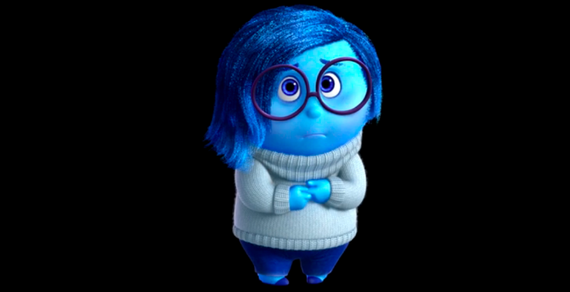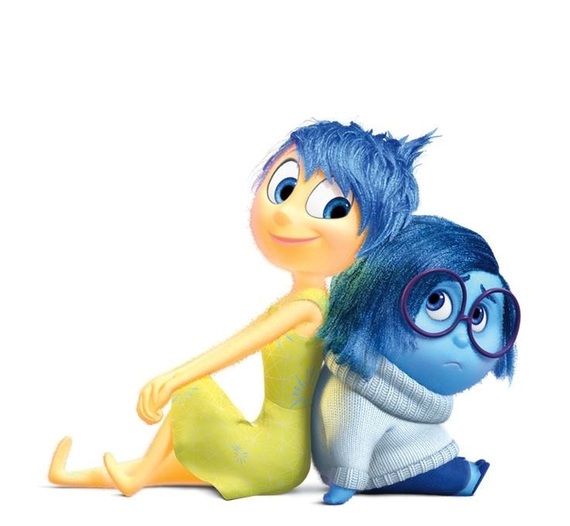I can't tell you how many times I've had people tell me, "Wow, it must be so depressing to do what you do." What I want to, and sometimes do, say is, "Not at all! It's beautiful to share in someone else's suffering and to feel less alone knowing I'm part of a species of overthinking human beings on an endless journey searching for happiness." What I usually end up saying is something painfully diplomatic, "Yeah it's hard work but very fulfilling."
I don't find depressing things depressing. I don't find problems, issues and stuck points melancholic. I certainly empathize with my clients who are in a state of doubt or confusion and draw from my own personal experiences when I've been in similar states of mind and heart. I've also felt the effects of vicarious trauma and burn-out or 'compassion fatigue' quite often during the last six years of clinical work, which often resembles depression or anxiety.
But here's the truth. What is truly depressing to me is when the discrepancy between how someone is told to feel and how they actually feel is gaping and unbridgeable. In other words, when we feel pain surfacing, the most depressing thing is to be told to "swallow it." Anne Lamott puts it much more elegantly than I ever can:
"Our lives and humanity are untidy: disorganized and careworn. Life on earth is often a raunchy and violent experience. It can be agony just to get through the day. And yet, I do believe there is ultimately meaning in the chaos, and also in the doldrums. What I resist is not the truth but when people put a pretty bow on scary things instead of saying, 'This is a nightmare. I hate everything. I'm going to go hide in the garage.'"
We often wrap uncomfortable emotions and situations in a "pretty bow" rather than acknowledging how terrible and deeply troubling they are. The emotions running on the joy and elation continuum are greeted with open arms. They are no-brainer emotions we openly flaunt. We are told to freely express them through words, body, dance, art, food, drinks and love making. We are made to believe that an overabundance of happiness is what makes the world go round and we hurry to drown out the pain signals that so clearly need attention.
Pain signals to us when undesirable things happen -- when we or our loved ones, the community we live in or the world sustains some degree of distress. Pain signals when life feels entirely too messy. Signals are loud and clear when unprocessed pain and unresolved issues from childhood resurface when we're in romantic relationships. Many of us frequently aren't quite sure how we're going to make it through the unchallenging job, the too-good-to-leave-too-bad-to-stay relationships, the annoying housemates, our family member's illness, the big scary questions we ask ourselves about our place in and contribution to the world, etc. These moments of being out of balance is usually when the waves of emotion rise: fear, sheer terror, grief, immense hopelessness, futility, jealousy, disconnectedness, uncertainty, numbness, sadness, anger, disappointment, loneliness.
And these are the ones we're told implicitly or explicitly to swallow, to get under control, to put a lid on, to have a better grasp on, to hide, diminish, dismiss, ignore, devalue. Often by well-meaning people around us who may not be comfortable attending to their own pain and vulnerabilities. These are the times when we don't (won't?) allow ourselves and each other to feel the full extent of what we need to feel (from the well-meaning pat on the back "Don't cry, be strong," to handing over tissues with an encouragement to "Smile"). Ladies and gentleman, that is the saddest, most depressing phenomenon in my opinion. Not to mention how annoying it is to be told "be positive!" when we feel like crap.
There's invaluable data inside pain and all the other emotions we label as "negative." I learn a lot about myself, namely, what I expect from the world and what I think the world expects from me. My younger-self emerges and asks for things my critical adult-self would never ask for. In witnessing these "negative" emotions in my friends and family, I also get a glimpse into what it is THEY fundamentally need and what their pain signals look like when their needs aren't met. I can grow closer to myself and also show up for those I love.
But the most important message I give my clients is this: our capacity for pain mirrors our capacity for love. When we allow ourselves to dive deep into our feelings of love, we will invariably feel the range of emotions associated with pain. Both cause our hearts to ache and both are profoundly necessary to living a whole human experience.
I am disappointed with therapists, media, life coaches, and self-help books promoting only positivity. I can't tell you how damaging it can be to the sense of self and normalcy. It results in judgments such as:
"I should be over this by now"
"Everyone else seems so happy, what's wrong with me?"
"I have to keep it together at work, at home, even with my partner"
"I never cry in front of people"
"Showing negative emotions is weak and a sign that you're not in control"
"Why can't I just be happier?"
We must honor our pain. We need to hold it to the light and examine what it's trying to tell us. We would never ignore a physical wound on our bodies, why would we avoid the emotional ones? Pain is a signal but more importantly it is a necessary part of the human condition. Feel it, listen to it, honor it. If you find the courage, allow a loved one to witness your pain so you're not alone. And when you've done that, you can then decide whether or not you've learned enough from it for now. Maybe you need to lean into the pain a bit longer to derive meaning or perhaps you'd like to set it aside for the time being and when it resurfaces, attend to it once more.
But please, for the sake of humanity, let's all just stop being so goddamn positive. Honor the beautiful, honor the ugly. Human experience is neither positive nor negative, it simply is and all of it is glorious.
-----------
HuffPost's GPS for the Soul app is based on two truths about human beings. First: We all have a centered place of wisdom, harmony and balance within us. Second: We're all going to veer away from that place, again and again and again. What we need is a great course-correcting mechanism -- a GPS for the Soul -- to help us find our way back to that centered place, from which everything is possible.
Because no one knows better than you what helps you de-stress and tap into that place of peace inside yourself, it's important for you to create your very own GPS guide -- a personalized collection of whatever helps you course-correct. Email us at GPS@huffingtonpost.com and we'll set you up with your very own HuffPost blogger account to share your guide on the site. If you're already a blogger, we encourage you to upload your personal guide today. We can't wait to see what you have to share.

